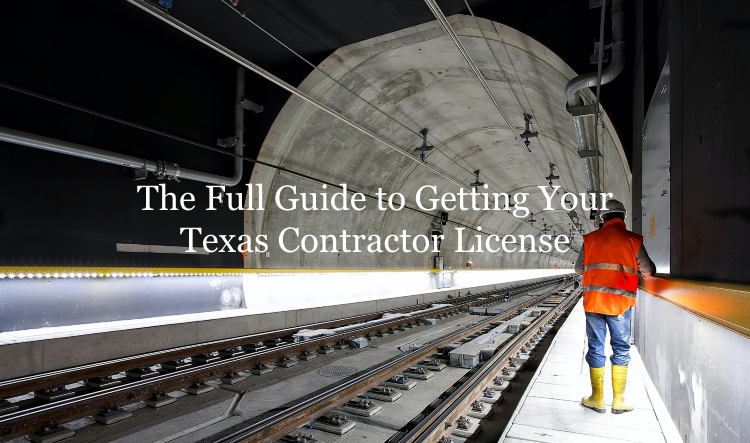How to Get Your Texas Contractor License: Step-by-Step Guide

To become a contractor in the state of Texas, you must obtain a license from one of the state or local licensing authorities.
- The Texas Department of Licensing and Regulation (TDLR) issues licenses to HVAC, electrical, and water well driller contractors.
- Texas State Board of Plumbing Examiners (TSBPE) issues and regulates licenses for plumbing contractors in the state.
- Local licensing authorities sometimes require general contractors, builders, home improvement contractors, and others to get licensed prior to performing contracting work. These contractors do not need to get licensed on the state level!
Do you want to get a contractor license in Texas? Here’s what you need to know about the licensing process!
1. Register a Business Entity in the State
Prior to applying for any type of Texas contractor license, you will need to register a business. For this purpose, you can use the SOSDirect Business Services Portal which will take you through the whole process.
Along with registering an entity, you will also need to get a Federal Employer Identification Number (FEIN). This number is issued by the Internal Revenue Service and you can apply to obtain your FEIN online.
Plumbing contractors do not need to register a business entity. General contractors may also not be required to form an entity but this varies from municipality to municipality. Make sure to check with local licensing authorities.
2. Pick Your Texas Contractor License Type
To recap, the following are the types of contractor licenses available in Texas:
Issued by the TDLR:
- HVAC contractor license
- Electrical contractor license
- Water well driller contractor license
Issued by the TSBPE:
- Plumbing contractor license
Issued by local/municipal authorities:
- General contractor license
- Specialty contractor license
- Home improvement contractor license
- Roofing contractor license
- Right-of-way contractor license
See the next section for a breakdown of the licensing requirements for each license type.
3. Meet the Texas Contractor License Requirements
The different types of contractor licenses in Texas have different licensing requirements. See the following sections for an overview.
General contractor license
 There is no statewide requirement to get licensed as a general contractor. This type of license is issued on a local level. To find out whether you need to be licensed to perform general, specialty, or home improvement contractor work, contact your local licensing authority.
There is no statewide requirement to get licensed as a general contractor. This type of license is issued on a local level. To find out whether you need to be licensed to perform general, specialty, or home improvement contractor work, contact your local licensing authority.
You are likely to have to demonstrate experience or education in the field you want to get licensed in. In addition, you will most likely also need to pass an exam and submit a Texas contractor license bond. The amount of your bond will vary depending on the license you are applying for and the local requirements.
HVAC contractor license
HVAC contractors in the state must meet a number of requirements. Applicants must have at least:
- 48 months of practical experience in the field under the supervision of a licensed HVAC contractor (in the past 72 months) OR
- 36 months of practical experience in the field under supervision (in the past 48 months) AND having obtained technician certification (within the past 12 months)
There are two different types of license classes for HVAC contractors:
- Class A – licensees can work on units of any size
- Class B – licensees can work on cooling systems of up to 25 tons and heating systems of up to 1.5 million BTUs/hour
To get licensed, applicants must pass an exam, obtain insurance, and complete the license application form.
Applicants must first submit their application and meet the remaining requirements and will be contacted to take the exam, once their application is reviewed. The filing fee for the license is $115.
Insurance must be in the following amounts:
- Class A – $300,000 per occurrence, $600,000 aggregate for property damage or bodily harm, $300,000 aggregate for products and completed operations
- Class B – $100,000 per occurrence, $200,000 aggregate for property damage or bodily harm, $100,000 aggregate for products and completed operations
 Electrical contractor license
Electrical contractor license
To become an electrical contractor in the state, applicants must employ a licensed master electrician or be a master electrician themselves. The master electrician license is separate from the electrical contractor license!
Applicants must obtain workers’ compensation insurance as well as liability insurance coverage. Liability insurance must be in the following amounts: $300,000 per occurrence, $600,000 aggregate for property damage or bodily harm, $300,000 aggregate for products and completed operations
Finally, applicants must complete the license application form. Upon submitting their application, they must also pay a $110 application fee.
Water well driller contractor license
Applicants for a water well driller license must have at least 2 years of experience under the supervision of a licensed water well driller contractor. Depending on the exact class and endorsement that you are applying for, you will also need to have a certain number of qualifying installations.
After meeting the above requirements, you must complete the license application form and submit it to the TDLR along with an application fee of $215.
Plumbing contractor license
There are four different types of plumbing contractor licenses that you can apply for:
- Tradesman Plumber-Limited
- Journeyman
- Master
- Plumbing Inspector
First, you must meet the eligibility requirements for the license you will be applying for. After that, you must complete and submit an examination application for that specific license type. Finally, upon passing the exam, you must pay a license fee.
4. Get a Texas Contractor License Bond
General contractors in Texas are frequently required to get a bond prior to being issued a permit or license to operate.
The amount of the bond varies depending on the location and the type of work you will be doing. Most contractor license bonds in the state are between $5,000 and $25,000.
To get bonded, you must pay a premium that is equal to a fraction of the full amount of your bond. Typically, applicants with good financials and a high credit score are offered premiums in the range of 0.75% and 5% of the total bond amount.
Want to get a free quote on your bond? Complete the form below and we will get in touch with you shortly!
Do you have any questions about getting a Texas contractor license bond? Call us at 866.450.3412 anytime!




Thoughtful piece – Just to add my thoughts if people are requiring a a form , my family filled out a fillable version here
http://goo.gl/RPyzZH